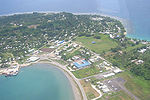List of cities and towns in Papua New Guinea by population
This is a list of cities and towns in Papua New Guinea by population.




Many of these figures were taken from the most recent PNG census, which was in the year 2000. Many population centres had substantially grown since 2000 (such as Port Moresby, Lae, Kimbe, Kokopo, Aitape and Mendi) due to increasing urbanisation in Papua New Guinea, and disaster recovery. On the other hand, Arawa has shrunk dramatically since 1990 due to war.
List of cities and towns
editOnly population areas with more than 5,000 people, or notable centres are listed.
| Rank | Settlement Name | Province | Population |
|---|---|---|---|
| 1 | Port Moresby* | National Capital District | 364,145 |
| 2 | Lae* | Morobe | 100,677 |
| 3 | Mount Hagen* | Western Highlands | 46,256 |
| 4 | Arawa | Bougainville | 44,865 |
| 5 | Madang* | Madang | 29,339 |
| 6 | Wewak* | East Sepik | 25,143 |
| 7 | Goroka* | Eastern Highlands | 25,000 ~ |
| 8 | Kokopo* | East New Britain | 20,262 |
| 9 | Popondetta* | Oro | 19,556 |
| 10 | Aitape | Sandaun | 18,000 |
| * | Rabaul | East New Britain | 17,044 |
| * | Hanuabada | National Capital District | 15,000 ~ |
| 11 | Kimbe* | West New Britain | 14,656 |
| 12 | Tabubil | Western | 13,800 ~ |
| 13 | Daru* | Western | 12,879 |
| 14 | Kavieng* | New Ireland | 10,600 ~ |
| 15 | Alotau* | Milne Bay | 10,025 |
| 16 | Vanimo* | Sandaun | 9,809 |
| 17 | Bulolo | Morobe | 9,500 ~ |
| 18 | Kiunga | Western | 8,265 |
| 19 | Tari | Southern Highlands | 8,186 |
| 20 | Kundiawa* | Simbu | 8,147 |
| 21 | Mendi* | Southern Highlands | 8,000 ~ |
| 22 | Kainantu | Eastern Highlands | 6,723 |
| 23 | Lorengau* | Manus | 5,829 |
| 24 | Ialibu | Southern Highlands | 5,478 |
| 25 | Kerema* | Gulf | 5,116 |
| 26 | Ningerum | Western | 5,000 ~ |
| 26 | Wau | Morobe | 5,000 ~ |
| ? | Wabag* | Enga | 4,072 |
| ? | Rabaul | East New Britain | 3,885 |
* Denotes a capital city.
~ Is an estimated population, all other populations were determined by the most recent census, in the year 2000. The next PNG census will be held in 2010.
? Denotes a population with an undetermined rank.
Disaster and population shift
editNatural and man-made disaster historically plays a major role in population shift in Papua New Guinea. The most notable are:
| Disaster/Population Shift | Place where affected | Notes |
|---|---|---|
| 1994 volcanic eruption | Displaced thousands of residents. | |
| 1997 Western Province drought | Left many agricultural communities in the highlands without food, and larger landlocked settlements that rely heavily on river shipping. Death toll is unknown. Many people permanently moved. | |
| 1998 earthquake and tsunami | Killed thousands of residents. Many places were also affected with disease afterward due to improper handling of the dead and greatly reduced living conditions. About 10,000 people became refugees. | |
| Ongoing Bougainville conflict | This conflict caused unmeasurable but significant displacement. The 2000 CIA world Factbook states that 20,000 people died in the conflict by 1997. | |
| Indonesian refugee population shift | Many refugee camps exist on the border of Indonesia, such as Black Wara, one of the biggest. The population of the Western Province refugee camps during the 2000 census was set at around 10,000, although the number of Indonesian refugees in the country is much higher. | |
| Squatter settlements |
|
Most population centres in Papua New Guinea have shantytown-styled settlements, referred to as squatter settlements. Many people move in and out of these settlements periodically, as village life becomes harder, the appeal of urban life and manufactured goods becomes greater, and efforts are made to disperse the residents. |
See also
editReferences
edit- "Final Figures". www.nso.gov.pg. 2011 National Population and Housing Census: Ward Population Profile. Port Moresby: National Statistical Office, Papua New Guinea. 2014.
- United Nations in Papua New Guinea (2018). "Papua New Guinea - Postal codes and Coordinates". Humanitarian Data Exchange. 1.31.9.